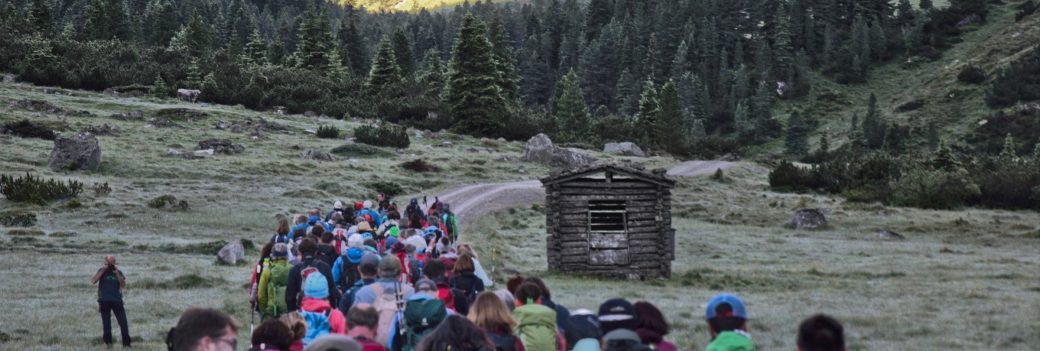It is often complained that in Austria there was silence about the Nazi period for decades. At the family level, this complaint is expressed in the accusation against parents/grandparents that they never spoke about National Socialism and were thus responsible for the ignorance of their children and grandchildren. This persistent myth of an all-encompassing silence must be critically questioned, because in Austrian post-war families, memories were indeed remembered and told. The only question is: What was told, but on the other hand, what was concealed and faded out?
A look at contemporary Austrian history by Margit Reiter.
Victim and hero stories
National Socialism was mostly told from its end. The beginnings of National Socialism, the possible own enthusiasm at Hitler’s invasion in 1938, the looking on and looking away or even the own (co-)perpetration remained excluded. This selective memory has an exonerating function, because one can present oneself as a victim: as a victim of Hitler, as a victim of the war, the bombs and destruction. In most cases, the memory was extended to the post-war period, so that one could finally also be considered a victim of the post-war hardship and the occupying powers – indeed, even former National Socialists stylized themselves as victims of denazification after the fact.
However, there were by no means only victim stories in the families, but often also hero stories, such as the war stories of former Wehrmacht soldiers, which revolved around fighting and survival. In the post-war period, for example, many men – often under the influence of alcohol, which loosened their tongues – certainly bragged about their “heroic deeds”. In doing so, they presented themselves as active agents rather than passive victims, thus breaking the official language barrier. The paternal war narratives fluctuated between heroization and self-pity, and some children could not/would not “hear them anymore.” The ubiquity of the war can be explained by the fact that almost every Austrian postwar family had a fallen soldier to mourn or a grandfather/father who had been in the Wehrmacht.
Many family narratives revolved around their own suffering and ultimately amounted to a retrospective justification and distancing. The range of justification patterns was broad: One had known nothing, had been only a small cog in the wheel, there had been dictatorship and coercion that one could not resist, and much more. The responsibility for National Socialism was shifted to a few demonized perpetrators (Hitler, Goebbels) and organizations (SS and Gestapo), from whom one distanced oneself after 1945 and with whom one wanted to have nothing (more) to do. The quintessence of these wordy dissociations ultimately remained the same: one had not been a Nazi oneself (it was always “the others”), and if this circumstance could not be denied, then at least one had been a “decent Nazi” whose idealism had been abused.
Family legends and taboos
At the same time, many family legends circulated in almost every Austrian family, mostly anecdotes about allegedly nonconformist behavior or acts of resistance that exposed one to the greatest danger and from which one subsequently derived a distance from the Nazi regime. These private “resistance” legends ranged from listening to “enemy radio stations,” refusing to give the Hitler salute, and black slaughter to the good treatment of forced laborers or even hiding Jews. What was not taken into account was that, for example, black slaughter was usually not politically motivated, but simply happened out of self-interest or out of necessity, and that although concrete assistance for persecuted Nazi victims sometimes existed, on the whole this remained the (rare) exception.
Probably the most effective legend is that of the “clean Wehrmacht”
Probably the most effective legend is that of the “clean Wehrmacht,” which was only shaken permanently in the 1990s by the exhibition on the crimes of the Wehrmacht, which was also shown in Salzburg. Many former Wehrmacht soldiers felt massively attacked and aggressively defended the accusation of Wehrmacht involvement in Nazi crimes. But it was not only the affected “war generation” that was outraged; there was also a closing of ranks between the generations, as many descendants sweepingly defended their parents’ generation under the slogan: “My (grand)father was not a murderer!”
In addition to these stories, however, there was also the much-cited silence and the gaps in the family memory. Two things in particular were concealed and hidden: one’s own responsibility and possible complicity on the one hand, and the suffering of others, the Nazi victims and persecutees, on the other. The topic of “Jews” and the “Shoah” was undoubtedly one of the central taboos of the postwar period. In fact, many descendants from the second generation cannot remember ever hearing about the extermination of the Jews in the family or at school. But they vaguely suspected that there had been something that it was better not to talk about without being able to name “it” more precisely. At the same time, anti-Semitism was consciously or unconsciously passed down through the generations. Other groups of victims were also kept silent for a long time, e.g. “euthanasia” and the resistance, deserters and other marginalized and persecuted groups of the “national community”. Such omissions and taboos continue to have an effect to some extent to this day.
The topic of “Jews” and the “Shoah” was undoubtedly one of the central taboos of the postwar period.
The family memory as a “puzzle”
However, the children are by no means only victims of their family imprints; they themselves have a significant share in the family memory. Many Nazi descendants have neglected to inquire more closely and to critically question the various family legends. One of the reasons for this reluctance to ask is the nature of family memory: stories about the Nazi era are usually not self-contained narratives, but small anecdotes and vague allusions taken out of context; they often remain fragmentary and incomplete, they usually lack concrete details of place and time, and they do not always correspond to an external logic or even to the truth. It is a kind of “puzzle” that has to be put together, whereby it is decisive which fragments the descendants pick up and which they do not, and how they finally fit these fragments into an overall narrative.
Since many did not ask, the descendants’ knowledge of their own family history was usually very limited. They therefore had to rely on assumptions and fantasies about their (grand)parents’ role in National Socialism, which can be both incriminating and exculpating. In order to fill the existing gaps in the family memory, the descendants usually pick up precisely those components of the story/s that seem most plausible to them and, above all, can be interpreted in favor of the (grand)parents. This is because the desire for exoneration is great. Not infrequently, the stories are even “rewritten,” i.e. changed by the children/grandchildren in such a way that in the end they undergo a complete change of interpretation: Former Nazis become resistance fighters and anti-Semites even become protectors of the Jews.
The consequence of this is that many descendants know very little about their burdened family history and many do not want to know more. Even if the hints of Nazi involvement were clear, there was hardly any danger of disclosure because the children overheard them due to their own fears. It requires a certain emotional readiness, but also historical knowledge, to be able to classify what is said and to put the family puzzle together – and of course not everyone has this. Not asking questions often happens out of fear of unpleasant discoveries or also out of a protective behavior towards oneself and one’s (grand)parents. This mechanism of not wanting to know is generally referred to as the “pact of silence”, which is often not broken for a very long time in families.
Many descendants know very little about their burdened family history and many do not want to know more.
Between Ancestors and (Non)Knowledge
How difficult and painful the questioning or even revision of a supposed “knowledge” can be is shown by the example of Mrs. H.S.[1], a daughter of an SS Einsatzgruppen commander who was responsible for the most serious Nazi crimes and who was shot in 1945 during his escape in the Pinzgau. Mrs. H.S. had always lived in the belief that her father had, after all, “only been in the Wehrmacht”, which she – like many other sons and daughters – regarded a priori as unproblematic. It was only at the age of 60 that she learned by chance that her father, contrary to her previous assumption, had been involved in Nazi massacres as an SS Task Force Leader. This new knowledge shocked her deeply. Until then, Mrs. H.S. (born 1939) had had an extremely positive, even idealized image of her father, whom she hardly knew due to her age. Her positive image of her father was primarily shaped by the glorification of her dead father by her mother and her family environment. It is not only in her case that the central role of women, mothers and grandmothers, in family memory becomes clear.
Mrs. H.S. had been “blindsided” by the new, unambiguous facts about her father’s activities. On closer investigation it turned out that there had been many indications of a possible perpetration even before the accidental revelation of the bitter truth: there were the circumstances of his violent death in 1945, there were wreaths of SS comrades on his grave, there was his award as a “blood order bearer” and a German film team had shown interest in his mission in the Crimea. The daughter apparently could not (and did not want to?) decipher these many clues as well as the half-truths and inconsistencies of the family lore.
Confronted with the truth, Mrs. H.S. found herself in a dilemma. On the one hand, there was the emotional need to exonerate her father and not to confront himself too strongly with his perpetration, but on the other hand, there was also the rational knowledge of his crimes and the necessity of distancing herself. Mrs. H.S. – after inner struggles – finally chose this path: Since her father’s perpetration could no longer be denied, she split off her “private” father from her “political” Nazi father, because this is the only way she can continue to maintain her positive father image. This case may be an extreme one, but in essence it touches on aspects that affect many Nazi descendants, who are also caught in the tension between not knowing – ancestors – knowledge. In the meantime, a lot has changed in Austrian society and in families with regard to National Socialism. There is much more knowledge about the Nazi era in general and with temporal and emotional distance many descendants also want to know more. Thus, more and more children and grandchildren are tracing their own burdened family history and thus creating certainty about the actual responsibility of their family members in National Socialism.
Information on the author: Margit Reiter is Professor of Contemporary European History at the University of Salzburg.
Literature references:
Margit Reiter, The Generation After. Der Nationalsozialismus im Familiengedächtnis, Innsbruck-Vienna-Bolzano 2006 (new edition 2018).
Welzer, Harald/Sabine Moller/Karoline Tschuggnall, “Opa war kein Nazi”. National Socialism and the Holocaust in German Family Memory, Frankfurt/Main 2002.
[1] Mrs. H.S. (anonymized) was one of my interview partners for my book on the “Children of the Perpetrators”; for details see Reiter, Die Generation danach, pp. 243-261.








